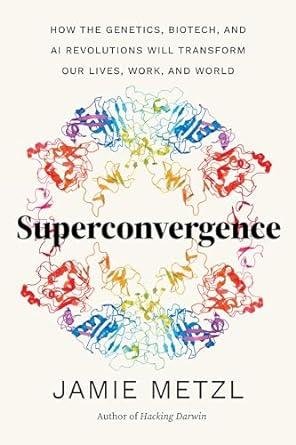The Dawn of Superconvergence
In the rapidly evolving landscape of science and technology, three powerful forces are converging to reshape our world: genetics, biotechnology, and artificial intelligence (AI). This phenomenon, known as "superconvergence," promises to revolutionize not only our lives and work but also the very fabric of society. "Superconvergence: How the Genetics, Biotech, and AI Revolutions Will Transform our Lives, Work, and World" delves into this transformative period, exploring the groundbreaking advancements and their far-reaching implications.
Genetics: Unlocking the Blueprint of Life
The study of genetics has advanced at an unprecedented pace, thanks to the Human Genome Project and subsequent innovations. By decoding the human genome, scientists have gained profound insights into the building blocks of life. This knowledge has paved the way for precision medicine, where treatments can be tailored to an individual's genetic makeup.
Genetic engineering, particularly CRISPR-Cas9 technology, has given researchers the ability to edit genes with remarkable precision. This opens up possibilities for curing genetic disorders, enhancing human abilities, and even designing future generations. Ethical considerations are paramount, but the potential benefits are immense, from eradicating hereditary diseases to extending human lifespan.
Biotechnology: Bridging Biology and Technology
Biotechnology is the application of biological systems and organisms to develop products and technologies that improve human life. It encompasses a wide range of fields, including pharmaceuticals, agriculture, and environmental science. The integration of biotech with AI is accelerating innovation in these areas.
In medicine, biotech has led to the development of biologics, complex drugs made from living organisms, which are revolutionizing treatment for diseases like cancer and autoimmune disorders. In agriculture, genetically modified organisms (GMOs) are increasing crop yields and resistance to pests, addressing food security challenges. Environmental biotechnology is offering solutions for pollution control and renewable energy production, contributing to a more sustainable future.
Artificial Intelligence: The Catalyst of Change
Artificial intelligence is the driving force behind many recent technological breakthroughs. Machine learning algorithms, neural networks, and big data analytics are enabling machines to perform tasks that once required human intelligence. AI's role in superconvergence is pivotal, as it provides the computational power and analytical capabilities needed to process vast amounts of genetic and biotechnological data.
In healthcare, AI is transforming diagnostics, drug discovery, and patient care. Predictive analytics can identify disease outbreaks, personalized treatment plans, and improve patient outcomes. In research, AI accelerates the discovery of new drugs and therapies by analyzing complex biological data at unprecedented speeds.
The Intersection: Genetics, Biotech, and AI
The true power of superconvergence lies in the intersection of genetics, biotech, and AI. This synergy is creating new opportunities for innovation and problem-solving that were previously unimaginable. For instance, AI algorithms can analyze genetic data to identify potential targets for new drugs, while biotech tools can rapidly develop and test these treatments.
One of the most exciting areas of superconvergence is synthetic biology, where scientists design and construct new biological parts, devices, and systems. By combining genetic engineering with AI-driven modeling, researchers can create novel organisms with specific functions, such as bacteria that produce biofuels or plants that clean polluted soil.
Implications for Society
The superconvergence of genetics, biotech, and AI is poised to bring about profound changes in society. These advancements have the potential to address some of the most pressing global challenges, such as healthcare access, food security, and environmental sustainability. However, they also raise important ethical, legal, and social questions.
Privacy concerns are paramount, especially with genetic data. As more individuals have their genomes sequenced, there is a need for robust protections to prevent misuse of this sensitive information. Ethical considerations in genetic engineering, such as the potential for "designer babies," must be carefully weighed against the benefits of eliminating genetic diseases.
The impact on the workforce is another critical area of concern. While AI and biotech are creating new job opportunities, they are also disrupting traditional industries and roles. It is essential to prepare for this transition by investing in education and training programs that equip individuals with the skills needed for the jobs of the future.
The Future of Superconvergence
Looking ahead, the superconvergence of genetics, biotech, and AI holds limitless potential. Personalized medicine will become the norm, with treatments tailored to an individual's unique genetic profile. Biotechnological innovations will lead to sustainable solutions for global challenges, and AI will continue to drive advancements across all scientific disciplines.
However, realizing this future requires collaboration across sectors and disciplines. Policymakers, scientists, ethicists, and the public must work together to navigate the complex landscape of superconvergence. By fostering an environment of open dialogue and responsible innovation, we can harness the power of these technologies to create a better world for future generations.
Conclusion: Embracing the Superconvergence Era
"Superconvergence: How the Genetics, Biotech, and AI Revolutions Will Transform our Lives, Work, and World" provides a comprehensive exploration of the interconnected advancements in genetics, biotechnology, and artificial intelligence. As we stand on the brink of this new era, it is crucial to understand the potential and challenges that lie ahead.
Embracing superconvergence means preparing for a future where the boundaries between biology and technology blur, and where human ingenuity drives unprecedented progress. By doing so, we can ensure that the benefits of these revolutions are realized, creating a world where innovation leads to improved health, sustainability, and quality of life for all.
